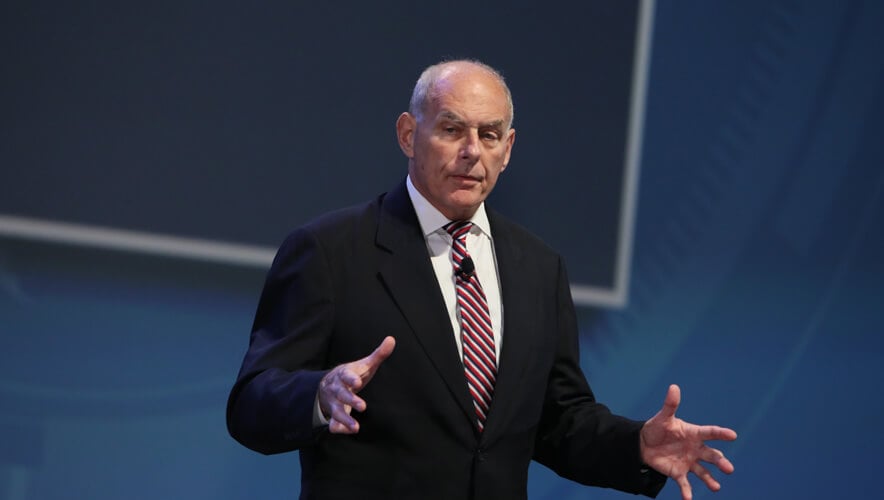Q&A: John Kelly on China, Partnerships, and Border Security
On 11 September, at Global Security Exchange (GSX) 2019, Marine Corps General John Kelly (Ret.) sat down with Security Management to discuss some larger issues the United States is grappling with, including China and border security. He also discussed the advantages of cultivating and maintaining private and public partnerships.
Kelly served the Trump administration from January 2017 to July 2017 as secretary of Homeland Security, leaving the post for the position of White House chief of staff, serving in that role until January 2019. He also served under President Barack Obama as commander of the U.S. Southern Command from 2012 to 2016. After resigning from his White House position, Kelly was hired as a board member for Caliburn International, a professional services provider with both commercial and public clients, largely operating as a private contractor to the federal government, notably the Department of Defense, State Department, and Customs and Border Protection agency.
An excerpt from Kelly’s conversation with Security Management follows, edited for length and clarity.
Security Management (SM): This morning, ASIS recognized the success of certain public and private partnerships. Given your background in the military and public sector, plus your current position in the private sector, what are some opportunities that you see now that you didn’t see before where the two sectors can work together to enhance our security?
John Kelly (JK): Well I think whether it’s security or medicine, the best ideas—for a lot of different reasons—come out of the civilian world anyways. There’s wonderful people in the government… but they are part of a bureaucracy, and the bigger the bureaucracy, the harder it is to move and the harder it is for good ideas to bubble up because there’s a lot more red tape.
As an example, years ago, the U.S. military used to develop its own weapons. We developed our own firearms. When we went into World War II, we were forced, because of the magnitude of the fight, to contract out. Now you have the military saying, “we need a tank, and it needs to be this, and it needs to be that.” And you tell private industry and like that (snaps fingers), they come up with a design, they build it, they test it, they say OK. So, the public–private advantage is the private industry is much faster, much more innovative, I think, and so the more we can build the public–private venture relationship, the better off we are.
SM: We’ve seen China reach out more and more across the globe with its Belt and Road Initiative, whether it’s through 5G or with blockchain methods, such as Huawei, and we’ve seen the U.S. attempts to curb that. We’ve also seen more humanitarian efforts, from China as well, such as reaching out to the Bahamas after the people there were devastated by Hurricane Dorian. What do you think can be done so that neither of those countries really encroaches on the U.S.’s sphere while still moving past technological or other hurdles?
JK: The good news is that many of these countries that China is investing in and helping need investment and help. But the thing that these countries need to be very careful about is, whatever the agreements are between these countries and China, if they can’t live up to those agreements, the Chinese can be pretty forceful in terms of what it does economically to people. I think China giving to the Bahamas—they should do it, they’re the second-biggest economy in the world. America helps leaps and bounds beyond what anyone else in the world does—but… the fact that (China is) helping is a good thing, but I hope they’re not helping with strings attached.
SM: And in terms of technology, what’s something that the U.S. can do to protect itself?
JK: As an example, with the Huawei thing, we’re within the limits of classification. That country is not what it appears, and it’s doing things, in terms of intellectual property theft, answering to the demands to the desires of the government of Beijing. They are working to steal ideas, as well as, if you will, to be able to influence the worldwide Net when they need to.
SM: In your keynote speech, you also mentioned border security, how there’s been politicization of the nation’s borders. When you politicize national security issues, how does that affect the department, its agents, and their efforts to accomplish their mission?
JK: This was the thing that just frustrated me to no end when I was in DHS and then in the White House. These organizations were created by the United States Congress, signed by the president, to do a certain mission. Let’s say CBP, Customs and Border Protection, they were created many decades ago to do a mission, secure the borders. They’re law enforcement, they’re well-trained, and they follow the law. They execute the law of our country that was also created by the United States Congress and signed by the president.
And suddenly, they’re bad people because they are doing their job and the politicization thing. So right now, it happens to be the Democrats who are not only attacking what they do but who they are. They’re good people, and it’s one thing for a politician to go after an organization or to throw rocks at the President about an organization, what he’s doing, and all that, but it’s another thing to attack people personally. They’re great people.
So, the fact that there’s disagreement in Washington over how to secure our borders, that’s existed for probably 200 years. What’s different now, which can get at the morale of people, is now they’re being attacked personally.
